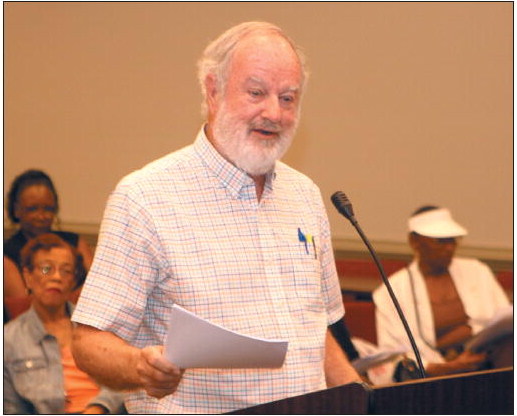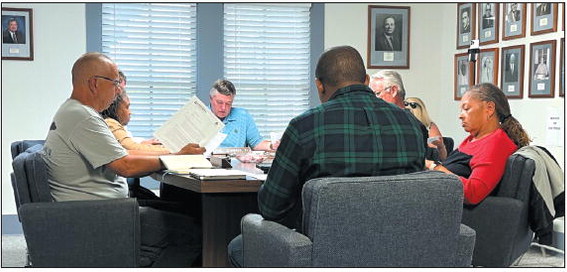Local Experts Weigh In On Proposed Building Codes


Contractors, property owners and managers, and more all gathered in the Vidalia City Council chambers on Wednesday, August 14, as the Council held a public hearing to discuss the proposed building code ordinance.
The City Council first introduced this potential new ordinance on June 10, as they completed the document’s first reading during the Council’s monthly meeting. The proposal was met with a lot of concern from citizens; thus, during the Council’s monthly meeting on July 8, City Manager Josh Beck announced that the City would be holding a public forum to discuss this legislation, as he asked for experts from the construction field to share their thoughts on the proposed ordinance.
When opening up the public hearing on August 14, Beck began by emphasizing the city’s desire to include the public in the ordinance drafting process. “We appreciate your participation and your time,” he told the audience. “We are trying to be as transparent as we can. We think it is critical to have public involvement. We all have to live under and abide by these laws. We don’t pretend like we know everything – we have a lot of continued from page
experts, especially in this field and ordinance, that we must hear from.”
Beck continued, thanking community members who had already voiced some of their concerns through phone calls or private meetings with Beck, as he shared that the proposed ordinance had already began to be edited after hearing these perspectives. “We are not trying to hinder growth with this particular ordinance; we are trying to promote growth. I think is important to know that we are trying to be fair with this process. We are not always going to agree, but we all want the same thing and that is for this community to be better and stronger,” he said.
City Attorney Daniel O’Connor informed the public of changes that had been made to the ordinance draft that was first proposed, which he said came from the Georgia Municipal Association’s model building code. “95% of the proposed ordinance is verbatim what’s in that code,” he remarked. “If you look into it, what you have is going to be what many cities in this state have as their building code.”
As for the 5% of the text that differs from the state model code, O’Connor says these changes are derived from the appeal process that Vidalia has proposed to put in place. If someone is aggrieved by a decision by the building official, they may appeal to a Board of Adjustment, which will be made up of 5 people appointed by the Council who preferably will be from the building industry,” he explained.
O’Connor also spoke on the difference in the current city building code – which can be found online through the city’s Municode database – and the proposed code. “[The current code] incorporates all of the international building codes very similarly to what we have [proposed], but it gives the building official pretty broad discretion on who’s licensed to do what,” he commented. “We have a building code now that basically puts the city marshal in charge [where] he can basically do what he wants. Meanwhile, what’s in front of you puts some limitations and an appeals process. It spells out a few things a little bit more.”
He added, "You guys know the building codes better than any of us up here, so if you address specific things within the [proposed] ordinance, that would be great.”
Harry Moses was the first citizen to address the Council and City Marshal Chad Phillips, as he suggested that a review committee of experts be formed to give detailed insight on the potential legislation.
“I have 26 comments, most are simple; and I’m sure that my colleagues have that many and more,” Moses told the Council. “I suggest that you convene a group of people who have interest in this and an ability to help to get those comments on the table, so that if you want to amend what you’ve published it can be with the help of city officials and people who are directly effected [by this].”
He concluded, “I’m in favor of improving ordinances, and I think this is close to what we need, but I think moving from where we are to this in one step is going to cause a lot of aggravation. So, I think a central measure process needs to be adopted to get to this without too much dislocation.”
R icky Mitchell echoed Moses’s statements, as he said that he agreed that having a review group would greatly help to ensure that the code was effective and practical. He spoke of his concerns regarding timelines of building permits, definitions of historic structures, the Building Official’s placement on the Board of Adjustments, the need for bonds, and more.
He also shared his thoughts regarding the document's requirements of permits to replace air conditioning units. “We just ran through a situation where a lot of air condi- tioners have gone out. You cannot wait sometimes to get a permit to go replace an air conditioner,” he emphasized.
Mitchell also stated that he was concerned about the number of people it would take to enforce this proposed code. “How many people will it take to do this? Chad is not going to be able to do this on his own – it’s going to take a bigger sta. You will have to have a building department other than just what you call a building official,” he said. “It is time that we update our building code, but I don’t think Chad understands how much of a load it will put on him. You aren’t going to do that with 2 or 3 people; it’s going to take 4 or 5 people. I hope we budgeted for that.”
Frank Champion agreed with Mitchell that the number of people necessary to effectively employ this ordinance within the city was alarming. “There is no way that 2-4 people could work to enforce this code without hindering growth,” he told the Council.
He continued, “I think y’all bought a car before you bought some horses. Right now, if y'all adopted this at the next meeting, pretty much every bit of construction in this entire county would stop – not just the city — because you have set forth a not very clear path going forward with this. There are no time frames on anything; there is some serious ambiguity.”
Champion remarked that he had found at least 8 places in the document where decisions were to be made to the “discretion or judgment of the building inspector,” as he claimed that these details greatly contributed to the ambiguity of the proposed legislation. “The appeals process is – at best – vague. There are no timelines, once again,” Champion commented. “The only time I did find in the entire document was the 90 days of building commencing upon issuance of a permit. While I do not build houses, I think some [people] might say that getting a permit and then breaking ground in 90 days [is not reasonable]. You don't want to start making schedules with builders without having a permit first.”
The citizen shared his own experiences building within the city, as he informed the council that he had been the first person to buy and rehabilitate a downtown building, which was derelict at the time of purchase. According to Champion, the new building code would not have allowed him to complete the structure’s work on his own, which would have greatly hindered the process. “I couldn’t personally afford to pay people to rehab that building. I would not have bought that property or rehabbed it.”
He stated that he knew of 8 other owners of downtown buildings that had completed the work themselves, and shared that he wonders how many of them would have purchased the structures if they could not work on them themselves. He gave another example of issues these permitting procedures would cause, as he explained, “I am currently trying to help fix rot on my neighbor’s shed. Under this, I would have to call for inspections, so my work of yesterday’s afternoon would be over a week-long project, and I would have to charge my 83-year-old neighbor double. I just hope y’all take some time and put a lot of thought into what you are doing. This is some of the most drastic action I have seen taken by the city council in my time in Vidalia.”
Champion added, “What happened? What building collapsed? What building caught on fire that should not have caught on fire that we had a problem with? I’m glad improvements are being made to the document because there are some clear problems here.”
Michael Alexander spoke to the Council as a representative of the heating and air conditioning contractors, as he summarized, “I’m all in favor of permits, inspections, and everything – but what you have and you are proposing here, you need to go into a little bit more detail.”
The contractor stated that there needed to be criteria for what should be treated as a major repair or minor repair in the codes, and that clarification needed to be added in the proposed ordinance about what exactly is required for new home construction permitting. He also explained that by requir ing the replacement of air conditioning units to be permitted, the City was indirectly raising the price of this service.
Terry Thompson, who informed the council he had previously managed the Memorial Health Meadows Hospital construction and now manages most of the commercial shopping centers in town, spoke to the Council on behalf of property owners, as he commented, “As we all know, one of the things we are all burdened with is taxation. I don’t think anyone in this room will disagree with that concept. I think first and foremost, improving the quality of the work and equipment how it’s installed, repaired, constructed, and replaced –everyone wants to see that. As far as the amount of bonding, I think that needs to be adjusted and addressed.”
He continued, “I’m always on the phone with some form of contractor or subcontractor. People vote with their money, and our owners know who in this town does good work and those that do not. We choose those who do good work and pay more for those that do good work. My perspective is that those who own this property, who already are paying taxes to the city and are paying good contractors and service providers, we feel like this could be a passed on cost to the owners, which is an additional tax.”
Architect Fred Dean emphasized the importance of limiting the amount of things which were left to the discretion of the building official, as he told the Council, “It should be tied to the building code itself instead of the discretion of the building official.”
Jonathan Tillery added, “If you keep your laws minimal and confidence in your leadership high, you will be all right. I just hope whatever y’all decide to do, you listen to the people around you and the people that are in the industry.”
At the conclusion of the hearing, Beck thanked the citizens for their comments and encouraged anyone who may wish to speak on the ordinance further to contact him by email (jbeck@vidaliaga,gov).
This ordinance is available for review by calling Vidalia City Hall or visiting the city’s website. The final vote on the proposed legislation is slated for September 9.







